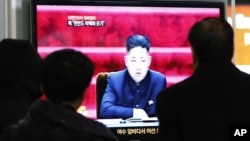SEOUL —
North Korea has reacted swiftly to additional sanctions imposed on it by the United Nations Security Council. Pyongyang is remaining defiant and hinting of a third nuclear test.
North Korea's foreign ministry says the U.N. Security Council was acting as a marionette (puppet) of the United States Tuesday when it adopted this new resolution in the wake of last month's rocket launch. The ministry calls the U.N. action “self deception and the height of double standards.”
The statement was read by an announcer on a North Korean radio newscast. He emphasized that the country will continue to launch satellites in order to “become a world-level space power."
The announcer said North Korea rejects any further dialogue about de-nuclearization and will take actions to bolster its military's self defense capabilities, including nuclear deterrence.
That is interpreted as a signal that the impoverished and isolated country intends to conduct a third nuclear test.
Neighbors react
South Korea's Unification Ministry spokeswoman Park Soo-jin says her government regrets the North's response.
She says Pyongyang must stop threatening international society with additional provocations, and clearly demonstrate efforts for de-nuclearization through specific actions.
Japan's Foreign Minister Fumio Kishida issued a statement saying Tokyo will continue to closely coordinate with the international community about North Korea. He also called for Pyongyang to refrain from provocative acts “including further launches and nuclear tests.”
South Korea's semi-official Yonhap news agency, quoting one of the country's senior diplomats, says Seoul and Washington are considering their own additional sanctions on Pyongyang.
That is to be discussed in talks Thursday between South Korean officials and U.S. special envoy Glyn Davies.
Sanctions
The Security Council unanimously voted to expand and strengthen sanctions against North Korea. That vote followed a behind-the-scenes deal between the United States and China over wording of the draft.
In addition to condemning North Korea's December 12 rocket launch, the resolution imposes sanctions on the country's space agency and a domestic bank used to facilitate weapons-related transactions.
Three individuals also have been added to the sanctions list: an official of the Tanchon commercial bank, a senior space agency official and the general manager of the Sohae Satellite Launching Station.
Space launch
North Korea claims the launch propelled into space an earth observation satellite. International scientists say the three-stage launch did place an object into orbit, but that the satellite has not transmitted any data.
Much of the international community condemned the launch, saying it clearly violated previous U.N. resolutions prohibiting North Korea from utilizing ballistic missile technology.
South Korea's defense ministry says analysis of first-stage rocket parts recovered in the Yellow Sea show the North now has the capability to build an ICBM with a 10,000-kilometer range.
Most analysts say they believe North Korea has yet to perfect the technology to place a miniaturized nuclear warhead atop such a missile, but that its space and nuclear programs appear to have that goal in mind.
North Korea's foreign ministry says the U.N. Security Council was acting as a marionette (puppet) of the United States Tuesday when it adopted this new resolution in the wake of last month's rocket launch. The ministry calls the U.N. action “self deception and the height of double standards.”
The statement was read by an announcer on a North Korean radio newscast. He emphasized that the country will continue to launch satellites in order to “become a world-level space power."
The announcer said North Korea rejects any further dialogue about de-nuclearization and will take actions to bolster its military's self defense capabilities, including nuclear deterrence.
That is interpreted as a signal that the impoverished and isolated country intends to conduct a third nuclear test.
Neighbors react
South Korea's Unification Ministry spokeswoman Park Soo-jin says her government regrets the North's response.
She says Pyongyang must stop threatening international society with additional provocations, and clearly demonstrate efforts for de-nuclearization through specific actions.
Japan's Foreign Minister Fumio Kishida issued a statement saying Tokyo will continue to closely coordinate with the international community about North Korea. He also called for Pyongyang to refrain from provocative acts “including further launches and nuclear tests.”
South Korea's semi-official Yonhap news agency, quoting one of the country's senior diplomats, says Seoul and Washington are considering their own additional sanctions on Pyongyang.
That is to be discussed in talks Thursday between South Korean officials and U.S. special envoy Glyn Davies.
Sanctions
The Security Council unanimously voted to expand and strengthen sanctions against North Korea. That vote followed a behind-the-scenes deal between the United States and China over wording of the draft.
In addition to condemning North Korea's December 12 rocket launch, the resolution imposes sanctions on the country's space agency and a domestic bank used to facilitate weapons-related transactions.
Three individuals also have been added to the sanctions list: an official of the Tanchon commercial bank, a senior space agency official and the general manager of the Sohae Satellite Launching Station.
Space launch
North Korea claims the launch propelled into space an earth observation satellite. International scientists say the three-stage launch did place an object into orbit, but that the satellite has not transmitted any data.
Much of the international community condemned the launch, saying it clearly violated previous U.N. resolutions prohibiting North Korea from utilizing ballistic missile technology.
South Korea's defense ministry says analysis of first-stage rocket parts recovered in the Yellow Sea show the North now has the capability to build an ICBM with a 10,000-kilometer range.
Most analysts say they believe North Korea has yet to perfect the technology to place a miniaturized nuclear warhead atop such a missile, but that its space and nuclear programs appear to have that goal in mind.





